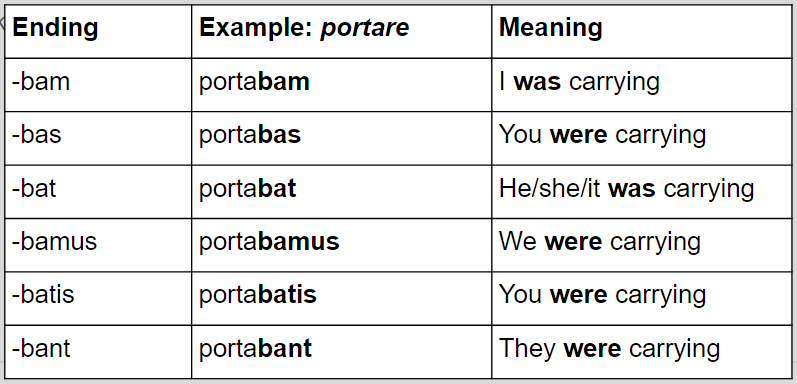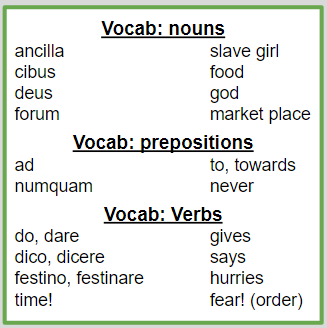Imperfect Latin Verbs: The Sheep Tense
January Latin Challenge: Day 12 of 31
Hi everyone, and welcome to Day 12!
We are still talking about verbs today, so I want to give you my Complete Verb Reference Guide. It is got everything you need to help you identify all verbs in Latin, from the basics right the way through to the most advanced grammar. You probably won’t need it all yet, but one day it will come in really handy.
I am only going to talk about active verbs today - if you want passives, they will be coming up towards the end of the January Latin Challenge, probably Day 27. Make sure to subscribe so you don’t miss it!
The Imperfect Tense in Latin.
This is actually my favourite tense in Latin, and yes I am a big enough nerd that I have a favourite Latin tense. The reason I like it so much is because it is super simple and really easy to recognise, but also very very useful.
To start with, the imperfect tense is what is called a “continuous action in the past”. This means that we use it to show something happening alongside another action in the past tense. For example, I was walking to the shops when I fell over.
The imperfect tense “I was walking” shows me that this action was happening in the past, and it was ongoing, whereas the perfect tense “I fell over” is a completed action - it only happened once.
When you see the imperfect tense in Latin, the important thing to remember is was or were. This is how you should aim to translate it.
How to form it?
As I said above, it is very easy to recognise the imperfect tense. It’s formed using the present tense stem, so you first need to find the Present Infinitive of the verb. This is the 2nd principal part in dictionaries.
For example, in porto, portare, portavi, portatus, I am looking at portare - the infinitive.
To make the imperfect tense, I take off the -re to get porta, and add my imperfect signifier -ba- to this stem. This -ba- is the bit that tells me it’s an imperfect. Then, I just add the person endings, -m, -s, -t, -mus, -tis, -nt, and that tells me who is doing the verb!
porta + ba + m = I was carrying.
If I want to say “He was carrying”, I take the porta-, add -ba-, and then add my 3rd person singular ending -t: portabat - he was carrying.
Impy the Sheep
I like to call this the “sheep” tense - imagine a sheep. We will call him Impy the sheep, because he’s imperfect - he doesn’t say baa, he only says ba. This can help you to remember how to recognise and translate the imperfect tense - Impy the imperfect sheep was eating grass.
Below are the endings for the imperfect tense - see how they all have the -ba- just before the person ending. This is really important, because some verbs have -ba- in their stem, but this is not before the person ending, so be careful.
Important note:
The imperfect tense can also mean used to…, so for example, portabam can mean I was carrying OR I used to carry. Just pick whichever makes the most sense in your translation.
Let’s try some examples in Latin.
Here are 3 sentences. Remember that in Latin, the verb is often at the end of the sentence or clause. As usual, I have the vocab below, and I also have the table of endings to help you. If you want a go at translating these before you check the answers, make sure not to read on until you are ready!
ancillae ad forum festinabant.
“numquam time!”, dicebas.
cibum deis dabamus.
Explanations below: only read on when ready
The verb is festinabant.
-ba- tells me its an imperfect verb, and the person ending -nt means its a 3rd plural, so “they” were doing it. From the vocab list I can see festino, festinare means hurry, so to put that all together I get “they were hurrying”.
Now I can find a nominative that matches my plural verb - ancillae means “slave girls”, so they’re in charge, and they were hurrying ad forum. So altogether, “the slave girls were hurrying to the forum”.
The verb is at the end again, dicebas, but I have speech marks! Keep that in mind.
So start with the main verb, dicebas. -ba- again tells me it is imperfect, and the -s ending tells me its you singular, just one person. So “you were saying”, or “you used to say”.
I can expect to find another verb in the speech marks, and here its “time!”, which is an imperative, an order, meaning “fear!”. An odd order to give someone, except we have missed the word numquam - never.
Altogether, and I am going to pick my secondary translation of the imperfect tense here because it makes most sense: “You used to say “never fear!”.
My verb is a 1st person plural here, “we were…” from the -bamus ending. I don’t need to look for a nominative, because “we” were doing the verb, meaning “giving”.
I look for what we were giving - cibus is my accusative, food. What have I got left, deis - this is a 2nd declension dative or ablative plural.
do, dare is a verb that often takes the dative - you give things TO people, so I can safely assume it is a dative here. The sentence means: “we were giving food to the gods”.
And that’s the imperfect tense in Latin!
Don’t forget to download the complete guide to Latin verbs from this link, it will really help as you practise recognising your different tenses.
I hope you have found this post useful! Thanks for reading, and I’ll see you tomorrow for Day 13 of the January Latin Challenge on bambasbat.




